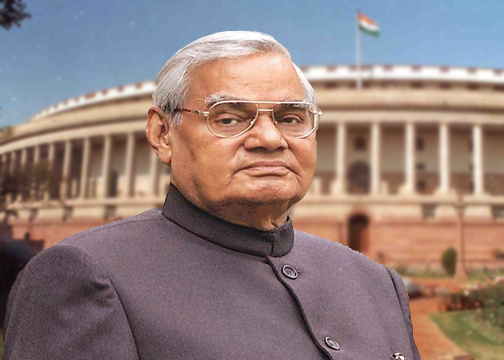Atal Bihari Vajpayee (25 December 1924 – 16 August 2018)
Atal Bihari Vajpayee was an Indian politician who had served as the Prime Minister of India in three non-consecutive terms. He was the member of Indian Parliament for over five decades and had been elected from four different states at different times, Uttar Pradesh, Gujarat, Madhya Pradesh and Delhi. He was the member of the Bhartiya Jana Sangha Party started by Shri Shyama Prasad Mukerjee in1951 and restructured it into Bhartiya Janta Party (BJP) in 1980. He was passed away at 93 due to illness at AIIMS in New Delhi on 16th August 2018.
Early Life of Mr. Vajpayee
Atal Bihari Vajpayee was born on 25 December 1924 in Gwalior, Madhya Pradesh to a middle-class Brahmin family Smt. Krishna Devi and Shri Krishna Bihari Vajpayee. His father was a school teacher and a poet. Vajpayee did his schooling from Saraswati Shishu Mandir in Gwalior and completed his graduation from Victoria College in Gwalior, now Laxmi Bai College. After that he did his post-graduation, M.A in Political Science from DAV College in Kanpur with a first-class degree. He was famous for his poems and known as Poet and an Orator.
He joined Rashtriya Swayamsevak Sangh (RSS) in 1939 and attended Officers’ Training Camp during 1940-44 and became an active and full-time member (Pracharak) in 1947. He also joined youth wing of Arya Samaj called Arya Kumar Sabha and became its general secretary in 1944.
A Political Career
He was an active member of Rashtriya Swayamsevak Sangh (RSS) joined in 1939. His political career was started his association with Bhartiya Jana Sangha (BJS) and became the national secretary of BJS of the northern region. In 1954 he went on a fast-unto-death with Shyama Prasad Mukerjee in Kashmir to protest against the perceived discriminatory treatment of Non-Kashmiri Indian visitors to the state, where Shyama Prasad Mukerjee wast arrested and died in prison due to strike.
In 1957, Atal Bihari Vajpayee was first elected to Lok Sabha from Balrampur Constituency. He impressed many including then Prime Minister Jawaharlal Nehru by his oratorical skills, where Jawaharlal Nehru predicted that Vajpayee would become the prime minister of India one day. After that in 1968, he became the national president of Jana Sangha.
In 1975, along with other opposition members he was arrested during internal emergency imposed by then Prime Minister Indira Gandhi. In 1977, during Morarji Desai’s government, he became the minister of External Affairs. On that year as Foreign Minister, Atal Bihari Vajpayee became the first person to deliver a speech to United Nations General Assembly in Hindi. But he resigned after a short term from his post after the resignation of Morarji Desai.
In 1980 along with Lal Krishna Advani, Bhairon Sing Shekhawat and other members of BJS and Rashtriya Swayamsevak Sangh (RSS) formed Bhartiya Janta Party (BJP) and he was appointed its first president.
On 16 May 1996, he became the 10th Prime minister of India and BJP emerged as the single largest party in the Lok Sabha. But after 13 days he resigned because he couldn’t get support from the other parties.
Again in 1998 general elections Vajpayee became the prime minister of India and BJP again emerged as the single largest party in Lok Sabha and named National Democratic Alliance (NDA) and got support from other like-minded parties. But this government lasted only 13 days as All India Dravida Munnetra Kazhagm (AIADMK) withdrew its support to the government.
In 1999, NDA won majority of 303 seats out of 543 seats in Lok Sabha and Vajpayee took oath as Prime Minister of India for the third time. This time he completed his five years as a Prime Minister of India till 2004.
Contributions
- He gave the green signal to the Pokharam Nuclear Test and making India a nuclear power generation.
- Vajpayee boosted bilateral and trade relations with the United States and in 2000 Bill Clinton Became the first American to visit India.
- He introduced Sarva Siksha Abhiyan and it was first time in India that elementary education became free for the children aged 6-14 Years.
- The Golden Qudrilateral (which connect metropolitan cities – Chennai, Kolkata, Delhi and Mumbai) and the Pradhanmantri Gramn Sadak Yojna were also introduced by him.
- Under his government that envisioned and laid the first physical line of Delhi Metro which is the lifeline of Delhi.
Awards
- 1992– Padma Vibhushan
- 1993- D.Lit. from Kanpur University
- 1994- Lokmanya Tilak Award
- 1994- Outstanding Parliamentarian Award
- 2015– Bharat Ratna
- 2015- Bangladesh Liberation War honour



